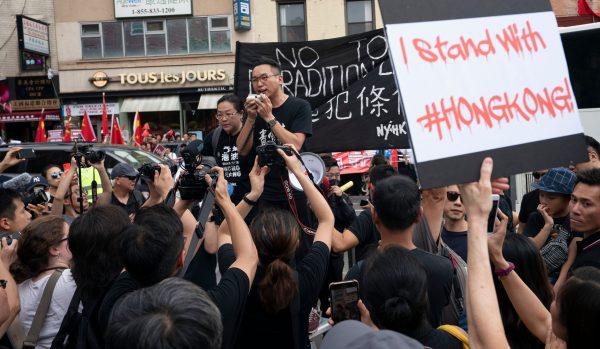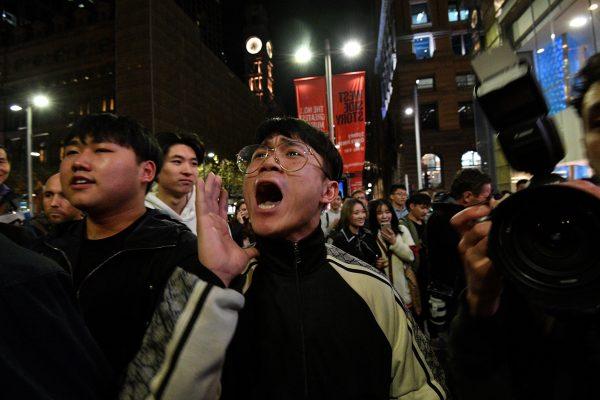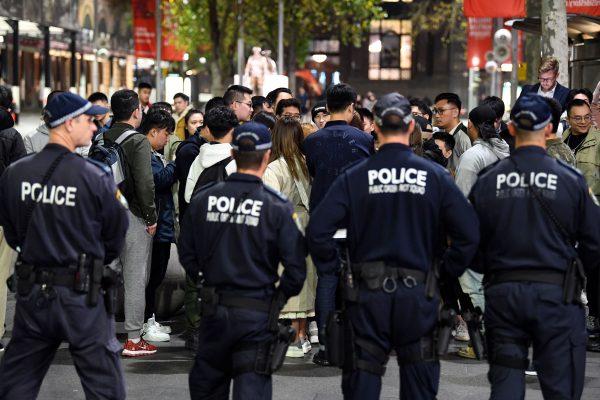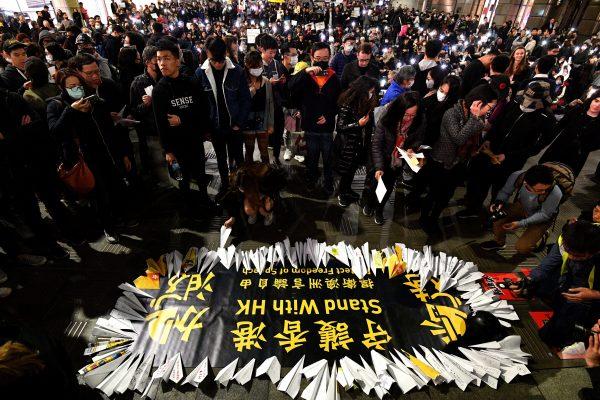As residents in countries around the world hold solidarity protests in support of Hong Kong protesters, many pro-China groups have attempted to disrupt the events, sometimes ending in rough clashes.
Since June, Hongkongers have taken to the streets in protest of an extradition bill that they believe will further erode the city’s autonomy from mainland China. In 1997, the territory reverted from British to Chinese rule, under the express guarantee that its autonomy and freedoms would be preserved.
But the bill, which would allow the Chinese regime to seek extradition of individuals to be trialed in mainland China, was perceived as a threat to the city’s independent judiciary.
Most recently, roughly 1.7 million turned up for a rally on Aug. 17.
In New York City, hundreds of Hong Kong and mainland supporters came to a standoff on the streets of Chinatown on Aug. 17, with pro-China activists waving the China national flag while booing and cursing at Hong Kong supporters.
The pro-Hong Kong rally proceeded regardless. Some speakers addressed the pro-China protesters.

“You [said] you enjoy the freedom of speech, how come you only voice your opposition here and not in Beijing?” said Alvin Yeung, Hong Kong lawmaker and leader of the pro-democracy Civic Party, who made an appearance while visiting New York City.
During the rally, people sang “Boundless Oceans, Vast Skies,” a Cantonese pop song that has become a rallying cry for freedom during Hong Kong protests. As they sang, they covered their right eye to express empathy for a female volunteer medic whose eye was hit by a bean bag round during clashes with police.
Similar scenes were repeated in many solidarity protests worldwide, including Canada’s Vancouver and Toronto, and Australia’s Sydney and Melbourne.
In Toronto, a rally on Aug. 17 saw hundreds of flag-waving mainland Chinese international students blocking Hong Kong supporters from participating in a scheduled march. They drove around in their luxury cars while chanting “Loser! Loser!”
In the evening of Aug. 18, some 80 Christians in Vancouver were surrounded by pro-Beijing people who made verbal threats as they left a prayer meeting for Hong Kong. The Christians had to be escorted out by the police for their safety, according to the South China Morning Post.

In Melbourne, Hong Kong supporters and counter-protesters got into a shouting match on Aug. 16, with the former shouting “Stand With Hong Kong” as pro-China group chanted “One China” from the other side. Pro-Beijing demonstrators also attacked a cameraman from the Australian Broadcasting Corporation (ABC) who was at the scene and attempted to damage his camera. Local police confirmed to the ABC that two men were interviewed regarding unlawful assault, before being released pending summons.
A pro-Hong Kong protester who identified herself with the nickname Aski told the ABC that she was targeted on the popular Chinese social media platform WeChat by pro-Beijing users, after she attended a protest at the University of South Australia on Aug. 17 without wearing a mask. Aski said that she was soon doxxed, as a photo of her at the protest, together with her full legal name and workplace, circulated on WeChat less than an hour after the protest.

Chinese Government Backing
In apparent support for Chinese citizens to disrupt and agitate protests, Geng Shuang, spokesperson for China’s Ministry of Foreign Affairs, told a reporter at an Aug. 19 press conference that it was “totally understandable and reasonable” for overseas Chinese to “express indignation and opposition” against acts supportive of the Hong Kong protests.Cheng Jingye, China’s ambassador to Australia, also hinted that retaliation was acceptable. “No responsible government would sit idly by,” Cheng warned in a statement on Aug. 17.
He also denounced Hong Kong protesters as “violent” and “radical”—words consistent with Beijing’s characterization of the demonstrators.
China’s state-run media have in recent weeks repeated such rhetoric to demonize Hong Kong protesters, spreading false information that portray Hong Kong protesters in a negative light.

‘Nothing Patriotic’ About Defending Chinese Regime
Political commentator Jason Ma told The Epoch Times in an interview that the response from the Chinese regime was “not surprising,” since its propaganda had already succeeded at inciting the overseas Chinese community to defend the Chinese regime’s narrative on Hong Kong.He said that this was a tactic that the Chinese Communist Party (CCP) has repeatedly resorted to in the past 70 years of ruling: divide and control—to identify a group of enemies in times of crisis “so that they [Chinese citizens] have someone to hate and forget about their own lack of freedom.”
“You never see in any other place a ruling party trying so hard to divide their people, to create hatred between one group of Chinese against another group,” he said.
Ma said that Beijing is concerned that Hong Kong’s dissenting voices will spread to the mainland. “If mainland people begin to mimic what Hong Kong people are doing, that’s the end of their ruling in China.”
Sheng Xue, a board member of the Canadian-based pro-democracy group Federation for a Democratic China, told The Epoch Times that pro-Beijing activists’ belligerent, and at times violent, behavior only demonstrated the Chinese regime’s “intolerable degree of control and brainwashing over Chinese nationals.”
Sheng said that by encouraging citizens to oppose Hong Kong protests in the name of patriotism, the Chinese government is showing its tyrannical nature to the world.
“The China that we now see is still under an authoritarian system...so there’s nothing patriotic about expressing loyalty to such a regime.
“Not only is this not an act of patriotism, they are also making the ruling party look bad. Only the Party is blinded by its own imbecility and fails to see.”





